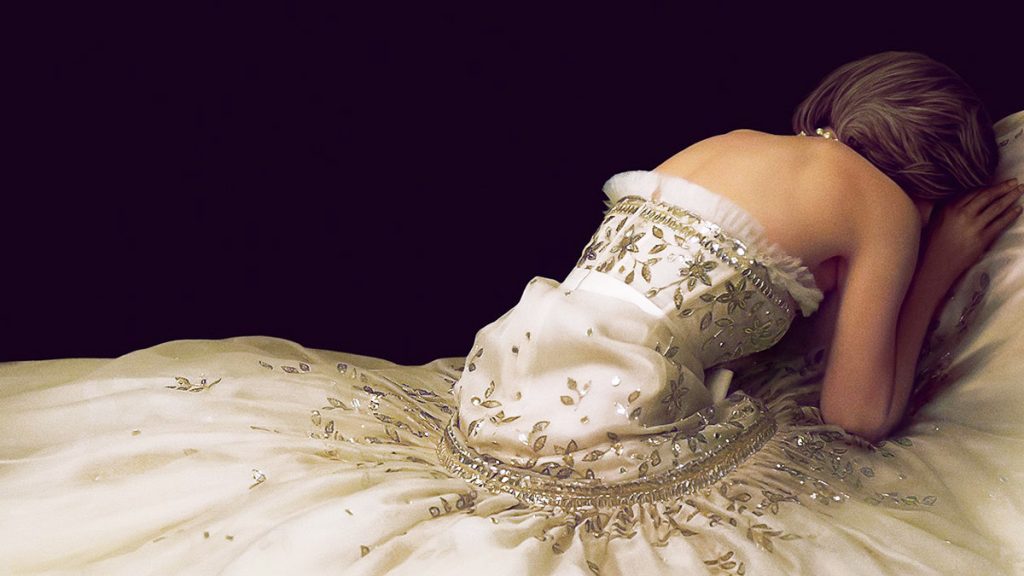Spencer: Intoxicating Study Of A Fragile Royal
Lady Diana Frances Windsor née Spencer ponders her legacy in Pablo Larraìn’s hazily sweet psychological dive into “the people’s princess”, as she grapples with her mental health in the wake of husband Charles’ infidelity and impending divorce.
‘Spencer’ sets itself across three days in 1991, opening as the Windsor family make their way to Sandringham Estate on Christmas Eve. Diana (a tenaciously fragile Kristen Stewart) who continues to use her maiden name Spencer as a brazen disregard of the rules, arrives late and alone. She has escaped her security detail, detoured to her derelict family home and reacquainted herself with the scarecrow from her childhood. Arriving at Sandringham House, she is welcomed coldly by new staff member Alistair Gregory (a sinister Timothy Spall) who forces her to be weighed upon entering. It’s supposedly a tradition, a “little bit of fun”. They say it’s a game that gained popularity in the house back in the 1800s, where you must gain three pounds to prove you have truly enjoyed yourself. Diana, who famously suffered bulimia, naturally recoils at this and tries to refuse, citing that she’s half jewellery anyway. It’s one of many moments of Diana flagrantly disrespecting the family. Stewart plays her slightly out of control in these moments, such as telling staff that she wishes to masturbate in a petulant attempt at not conforming.
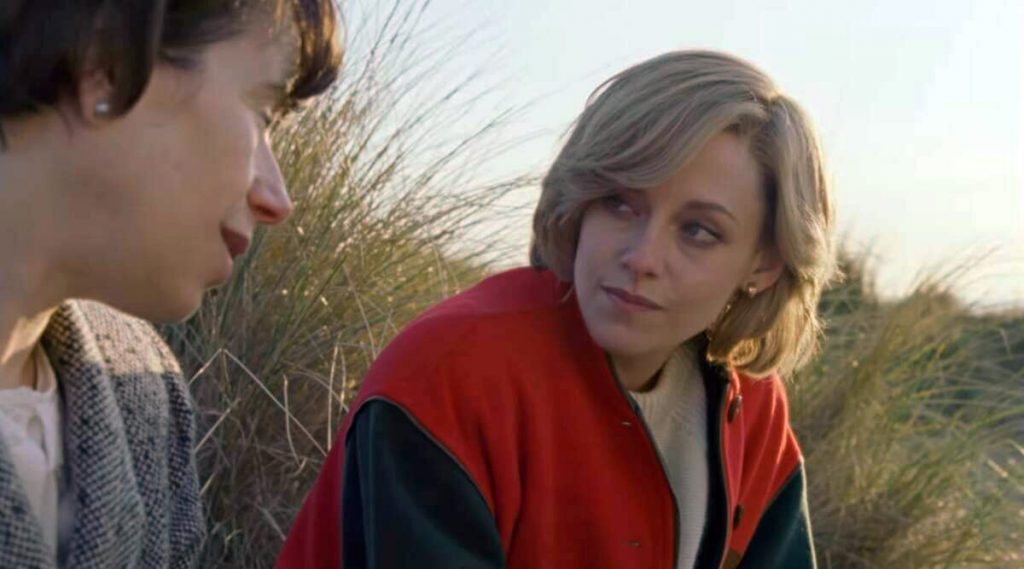
At this point in history, Diana had been at the forefront of much vitriol at the hands of the press, and her “antics”. These so-called antics aren’t described, but you get the exact sense that these are actions that would be considered normal, as she fights this tyrannical nature of constriction. As she rightfully says to Charles (a subdued but silently seething Jack Farthing) “it’s not you they’re after” – even though it was his infamous affair with Camilla, alluded to very briefly, that should have made him the victim of the press’ criticisms. ‘Spencer’s Diana appropriates this attack by the press and weaponises it, in an attempt to blow up the Christmas ‘fun and games’ that everyone continues to partake in. Scenes such as entering the grounds late at night, forcing the hands of police to attempt to escort her back on site are treated as a subconscious effort by Diana for the press to see her. It’s all subordinate, and designed to subtly tell the family they can’t control her. There’s a delightful choice to avoid showing any disrespect in the faces of the family to Diana’s actions as Larraín consistently keeps her a focal point for the camera’s point of view. This helps acclimate the audience to a contrasting but fascinating idea: Is Diana being victimised or is she paranoid? This stiff upper lip mentality is ingrained into every fibre of the direction behind the Royals. It forces Charles and Queen Elizabeth (Stella Gonet) to exert their silent power in other ways, such as demanding the sewing together of curtains, metaphorically imprisoning her in this massive cold building. No scene is more indicative of this mindset than when a distraught Diana breaks down at dinner, while Charles and the entire Windsor family remain stuck straight-laced in the rigour mortis of custom.
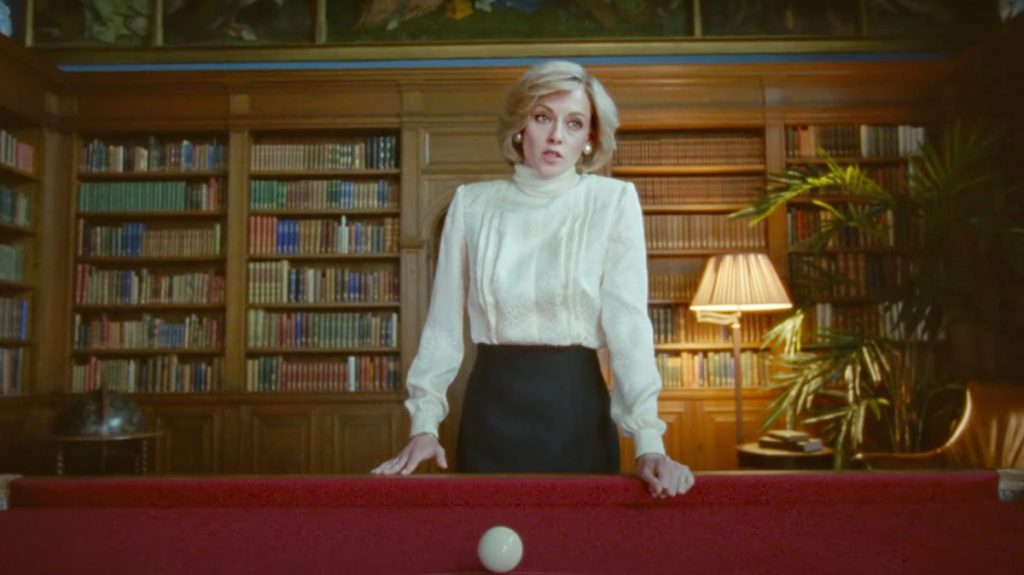
Grand halls filled with lobsters, soufflés, radishes and produce from a single farm are salivatingly shown as the kitchen staff prepare a continuous feast. Head chef Darren (an extraordinary Sean Harris) dictates in hushed commands to his waiters to step softly, and the heavy influence of the family is never more apparent than when this man who holds himself with such purpose looks fearful at the idea that the family will check that the produce used is organic. It’s in this decadence that director Pablo Larraìn, and writer Steven Knight, very cleverly frames her spiralling mental health and eating disorder into a contradicting dichotomy against the gluttonous power that forces her into submission. She purges herself from the indulgent sustenance, food itself representing the family and their excess. It’s only when she is allowed her own autonomy that she eats, symptomatic of the deep shame she feels for wanting to eat ‘normal’ food when this family are happy gorging on luxurious ingredients. When a midnight moment of starving satiation is interrupted, it allows us to view this shame through Spall’s Gregory, who was brought in to manage everything, including the – never spoken out loud – idea of babysitting Diana.
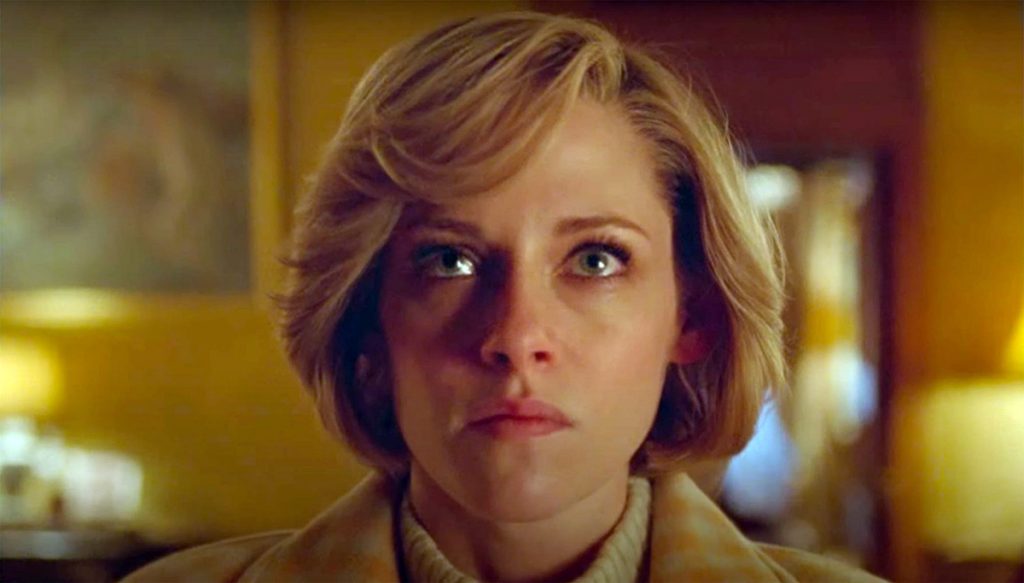
The aforementioned dinner breakdown entails a moment where Diana imagines she is eating the pearls suffocatingly strung around her neck, much to the chagrin of the audience as she crunches down on them, in a way that one can only imagine would break teeth. This is one of the many surrealist elements that Larraìn employs to create an atmosphere equal to Diana’s mental state, whose mental fragility is tested by the stress of the lucid nightmare she finds herself in. Diana starts hallucinating Anne Boleyn – in one of the many far too on-the-nose nods to martyrdom – and to consistently imagine the suicidal actions she wished she could take. These hallucinations of Anne Boleyn derive from a book left mysteriously on her bed by an unknown servant, adding to the paranoia of the picture. Larraìn utilises the vast space in this palace to minimise Diana in the frame often, helping the audience attach to the disconnect she feels. The production values in these massive rooms all add to this idea that Sandringham Palace is a prison for her, and not just because she is swarmed by the ghosts of Windsor past looming over her in their elegant golden frames. Closed curtains, cold beds and a routine planned for her strip away any independence. Luscious clothes are laid out and planned for every moment of the day, becoming more so a straight jacket in this monolithic facility. The clothing is one that she fights against and switches, breaking the pattern and deciding to wear her Boxing Day outfit on Christmas Day instead in a fit of insubordination. This is one of the many moments that plays with the idea of the unaware privilege that Diana has, as the film shows staff being removed from her service in reaction to this clothing change. That is until Maggie, the only friend she feels she can truly speak to, is taken away. Straight after Diana realises this she takes a -literally golden- shower, importantly highlighting that under her abrasive attitude, she’s still very much human and vulnerable and fragile.
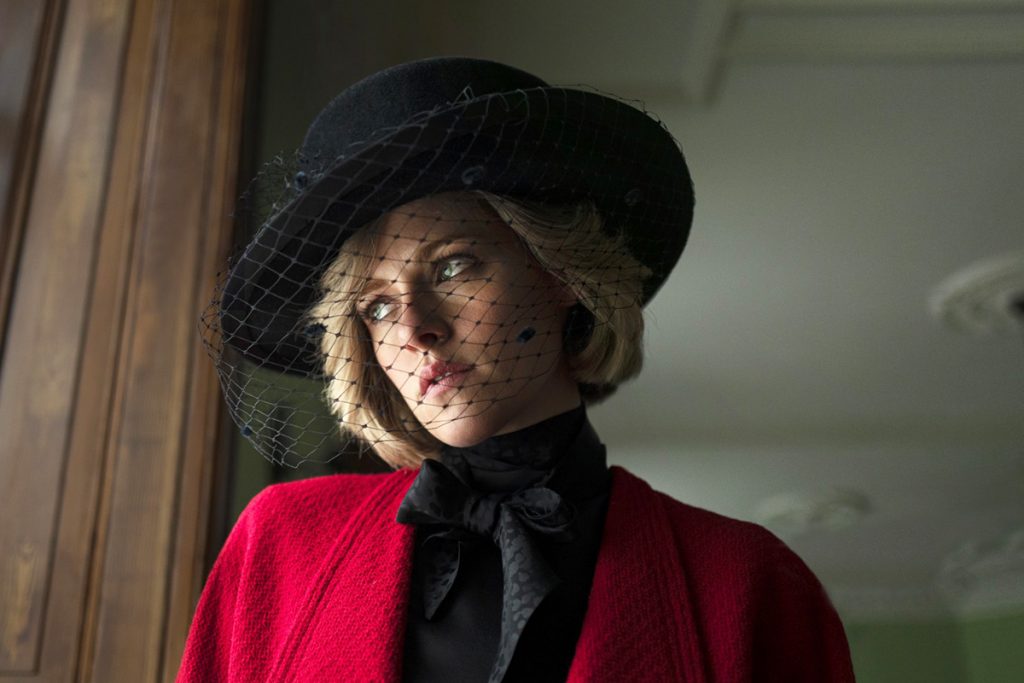
While ‘Spencer’ is often anomalous, wild and bizarre, it’s fascinating to see how it can transform from harsh madness to gentle and caring. Diana’s interactions with her children Harry (Freddie Spry) and William (Jack Nielen) are heartwarming and melancholic. It’s heartbreaking that these children, who are shown as playful but wise beyond their years, are witnessing their parents slowly separating. Harry and William themselves are becoming indoctrinated by Windsor traditions, such as shooting pheasants for sport on Boxing Day, an aspect that contributes significantly to Diana’s mental state. There’s a small humane moment in which Diana speaks to them and asks them to tell her when she’s being silly, indicating her self concept is deteriorating. It’s a concept that lightly hints and deepens the trauma that children of divorce encounter, allowing their characters to really flourish in these moments and as an audience to truly empathise with them. A hard task to achieve with characters who have such a wealth of privilege thrust upon them. None more so than Diana, who grew up wealthy, less than a mile away from the royal family, while being descended from Charles II herself and famous historical figures such as Winston Churchill and Audrey Hepburn.
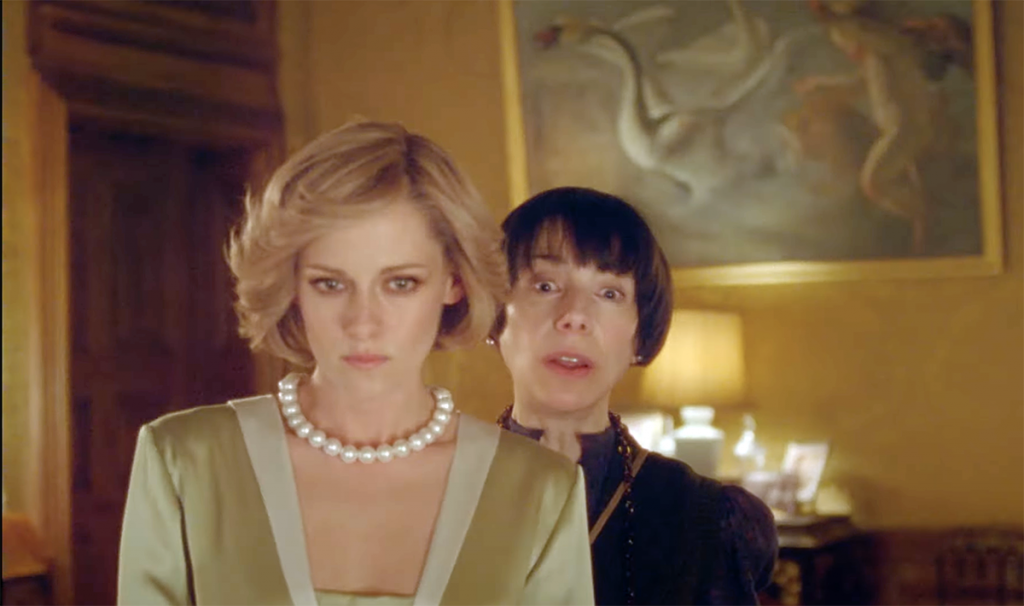
There is a wonderful single line that references this privilege Diana had, in which when speaking to her dresser and confidante Maggie (an always lovely Sally Hawkins), says she wants to be more middle class and go to ‘The Phantom of the Opera’ and eat fast food. It’s a small strength of how deep Knight has thought about the character of Diana, in that a woman who fights against the rigmarole of high life, doesn’t really understand the true social barriers in society that she rallies against. All Diana knows in ‘Spencer’ is the myopic notion that she doesn’t want to be involved in the echelons of high society, but has a distinct lack of self-awareness when discussing this. The scene plays as funny, but it becomes a terrifying indictment of high society as a whole.
This is all set to astounding visuals from Portrait of a Lady on Fire’s cinematographer Claire Mathon who creates this dreamy renaissance painting look to the film, allowing the creamy pastels and the misty flurry of a classically grey British winter to blur the paint strokes of time between the past, present and future. She utilises a psychological sharpness in confined close-ups that never lets the audience get truly comfortable. At least not until Diana’s three-day imprisonment is over and the films claustrophobic outlook opens up in the films somewhat sunny epilogue. Further, a jazzy and often harsh Jonny Greenwood score punctuates the picture in fashionable style, from the tinkling of pianos when Diana is speaking to Harry and William, to violent violins when she is suffering from a breakdown. Words cannot describe well enough Greenwood’s work here. It is potentially the most vital element of the film outside of Stewart’s enigmatic, mesmerising performance.

As the title card suggests, this is “a fable of a true tragedy” so we shall never truly know how accurate this is. The royal family will never allow fallibility to be shown and will remain blissfully unaware that their inability to admit shortcomings instead shows weakness. ‘Spencer’ uses this idea of infallibility as commentary on the dynamic between Harry and Meghan Markle, and the Royals, in how the family disregards any idea of mental health support for Diana, with Charles brazenly telling her not to embarrass him by regurgitating the food that people have cooked for her.
‘Spencer’ is an intoxicating study of a woman caught in the cyclical nature of familial appeasement and loss of liberty amidst a media storm. It showcases Diana at the lowest of points, and how a family wielding so much power is obsessed with appearance while being burdened by their own history. This psychological horror is empathetic to Diana’s struggle, at times funny and permeates the royal family in ways that haven’t been seen before, all while being a beautiful and transfixing, chaotic entry into the pantheon of biopics.
Spencer will be released in UK cinemas from November 5th

 6.6
6.6

Photos
See all photos >>




